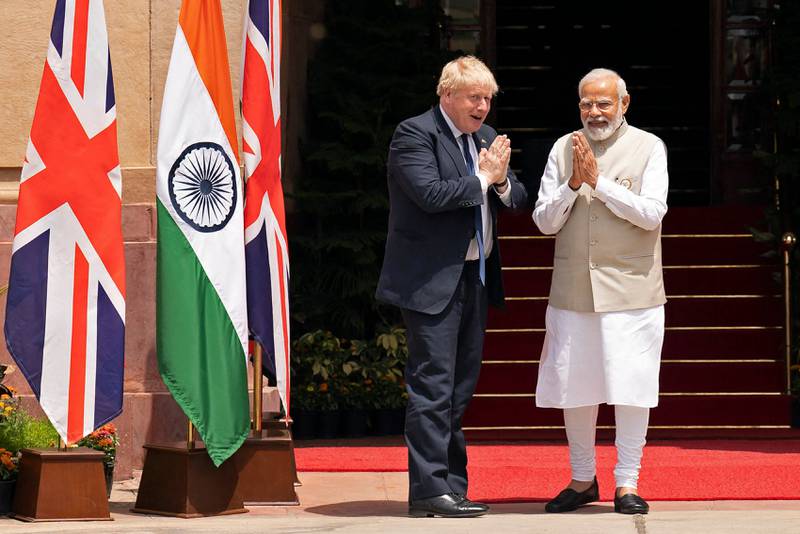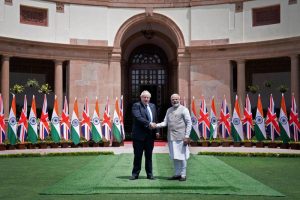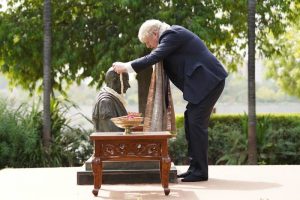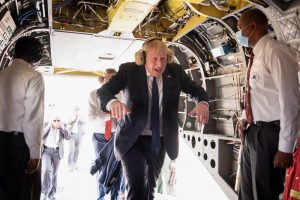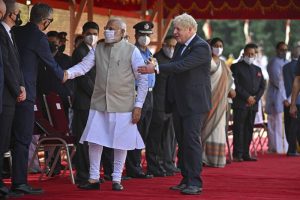British Prime Minister Boris Johnson agreed to a new defence and security co-operation deal with India at a meeting with his “special friend” Narendra Modi in New Delhi on Friday.
Western countries, led by the US, have been attempting to lure India away from its long-time ally Russia, its main arms supplier, since the invasion of Ukraine that New Delhi has refused to condemn.
“We’ve agreed to a new and expanded Defence and Security Partnership, a decades-long commitment that will … forge tighter bonds between us,” Mr Johnson said in a joint press statement in which he also called Mr Modi his “special friend”.
Mr Johnson, who is on a two-day visit to India, arrived in New Delhi late on Thursday after making a day-long trip to western Gujarat state where he announced new investment worth £1 billion ($1.3bn).
The two leaders on Friday agreed to deepen bilateral ties in the defence, security and trade sectors, particularly in the Asia-Pacific region where China is expanding its influence.
Mr Johnson said the two countries discussed next-generation defence and security collaboration across sea, land, air, space and cyber in the Indo-Pacific region.
“The threats of autocratic coercion have grown even further and it’s therefore vital that we deepen our co-operation including our shared interest in keeping the Indo-Pacific open and free,” he said.
Early on Friday, Mr Johnson laid flowers at the tomb of Mahatma Gandhi before Mr Modi received the UK prime minister at a ceremonial reception at the Presidential Palace.
The British leader thanked Mr Modi for the “fantastic welcome” and said his India visit was a “very auspicious moment” for both countries.
Mr Johnson’s India trip has been twice postponed because of Covid-19 flare-ups in each country and comes as a respite from the “partygate” controversy that has sparked calls for him to step down.
British MPs on Thursday agreed to launch an investigation by a parliamentary committee into Mr Johnson’s previous denials to the House of Commons that gatherings at Downing Street during the pandemic lockdowns constituted a breach of the government’s own laws, sparking widespread public anger.
But he rejected the demands and insisted he would remain in office, although admitting that he understood “people’s feelings”.
Mr Johnson’s India visit comes after hectic diplomatic efforts by western countries to lure the South Asian nation away from its long-time ally Russia following its invasion of Ukraine.
Post-Brexit, London has been seeking new markets and free-trade agreements, especially with countries in the Asia-Pacific region that are some of the fastest-growing economies.
India is the second-largest foreign direct investor in the UK. Its exports to the UK stood at $8.15bn in 2020-21, while imports totalled $4.95bn.
New Delhi has been insisting on visa relaxations for students and professionals in exchange for a deal, with Mr Johnson hinting that his government will accommodate concerns that could have stalled the talks.
“UK is creating an India-specific, open general export licence, reducing bureaucracy and slashing delivery times. We aim to have a new free trade agreement by Diwali [in October] … this could double our trade and investments by the end of the decade,” Mr Johnson said.
The British prime minister also emphasised that the two countries are taking forward the Green Grid Solar Power initiative set up to provide surplus renewable energy to create an integrated global electricity network.
The two countries have signed new partnerships on defence, artificial intelligence and green energy, along with investment deals in areas including robotics, electric vehicles and satellite launches.
TN


